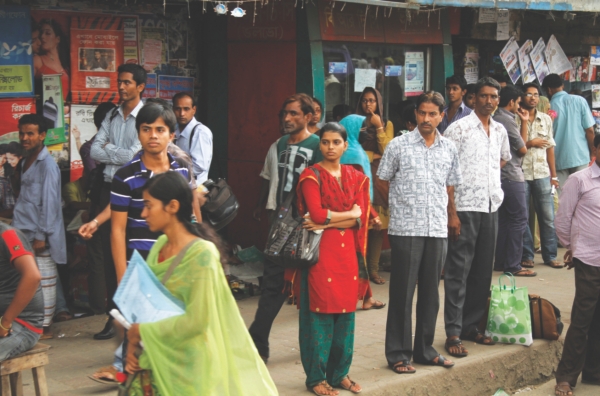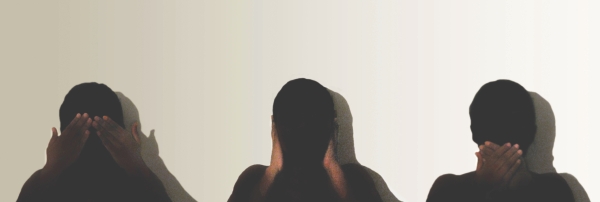| Home - Back Issues - The Team - Contact Us |
 |
| Volume 11 |Issue 38| September 28, 2012 | |
|
|
Perspective
Turning a Blind Eye Soraya Auer A woman lies on the ground with one shoe off, her clothes torn and her blouse buttons ripped off. She is too in shock to call out for help or even sit up. Even if she could cry, there would be no one to hear her on the empty street. This, unfortunately, is a scene that takes places regularly in most cities of the world, including Bangladesh's. Sometimes these incidents get reported, sometimes the culprits are brought to justice, but more often than not, the victim just wants to forget and pretend it never happened. However, not every assault and rape goes unnoticed by the rest of the world. A passerby may see something disturbing, a resident might be at his or her window and see the crime, or the watchful eye of a building's guard or CCTV camera may stand a few metres away.
In an affluent and busy neighbourhood of Dhaka last week, a young woman was raped on a residential road while at least one resident watched from his window and guards stood behind their gates. She cried and called for help, but no one shouted 'stop' at the men who were holding her down, no one ran forward to disperse the attackers, and no one even picked up the phone to call the police. What happened to the woman is unknown and the crime was probably never reported. What remains are only the rumours on that street that a woman was raped in front of homes and no one did anything about it. “At first I thought she was a prostitute and that it was consensual,” said the resident afterwards. When asked why he didn't do anything after he realised she wasn't, he couldn't give an acceptable answer. “I thought they might hurt me if I got involved. What was she doing with that bunch of guys in the first place?” said the guard, who watched from a safe distance. “I was afraid they'd turn on me,” “I couldn't have helped,” “She shouldn't have been there,” and “I didn't know what to do,” are all excuses cowardly witnesses give. No one can blame an assaulted or raped woman for wanting to live a normal life after a traumatic ordeal she could not stop from happening to herself. No one can blame her for ignoring the physical and mental pain she struggles from. But what excuse does a witness have to live as if nothing happened when they know they turned a blind eye to a person in pain and in need of assistance? None. Bangladesh is a country where we familiarise strangers by calling them brother, sister, uncle and aunty, where we jump at the opportunity to beat up a bad driver when he hits someone, where we ask personal and intimate questions that don't concern us and yet, we seem able to look the other way when a woman lies crumpled in plain sight, desperately in need of an intervention. What makes such inaction acceptable in the minds of an unhelpful witness? Is it because of the victim's gender? Is it because the witness would be or has been the perpetrator at another time? Is it because the witness is just curious to see what happens during a rape or an attack? What is it that stops us and the namely the men who are more likely to witness such crimes as they are out on the streets at all hours from having two thoughts: 'this is wrong' and 'I must do something to stop this'? How can anyone live with themselves and their conscience if they ignore wrongdoing and how can they answer to God if they know they once chose to do nothing to help someone in need? There's always that age old excuse, one person can't change the world so why bother. But the truth is all change starts with one person so no person is too small to make a difference. If someone was to stop a woman from being violated, they'd be making a difference to her ordeal it wouldn't just be a rescue, but an answer to her prayers.
You don't need a university degree to recognise a woman in distress so lack of education cannot be an excuse. In a country where religion and respect is ingrained in our culture, a lack of morals is also not plausible. Witnesses making up stupid reasons to explain why an attack is happening like 'she must have deserved it', 'she provoked it with her clothes', and 'she's a loose woman' are just blaming the victim rather than pointing fingers at the perpetrator. It is staring a witness in the face who is lying on the floor in pain and who is in the position of power the whole situation is screaming evil. Violating a woman's body is a crime. It is wrong. Absolutely nothing can justify it. I would be horrified at the thought of any woman of any class being subjected to a sexual assault outside my home. I would be even more mortified if not one of the guards who are supposed to protect me at home could not bring themselves to step outside to protect another person. Would I get involved myself if I saw something that disturbed my conscience? It's very likely that, with all that adrenaline, the attackers would turn on me. But despite that, I'd like to think I would at least do something to interrupt the terrible actions in front of me. In a country where there is a culture of vigilantism on the streets, there is inaction when it comes to violence against a woman. It shouldn't matter what she is wearing, who she is with, or what her past is, the victim is a human being with parents, maybe a family of her own, with responsibilities, thoughts and emotions. Nothing makes it okay to stand by and watch a crime that involves a person in pain. This behaviour is not unique to one street in Dhaka, it is pandemic to our part of the world and we seem unable to break a terrible tradition of silence. If the next rape victim was your friend, sister, daughter or even your wife, would you not want someone else to step forward and help her?
|
||||||
Copyright
(R) thedailystar.net 2012 |


